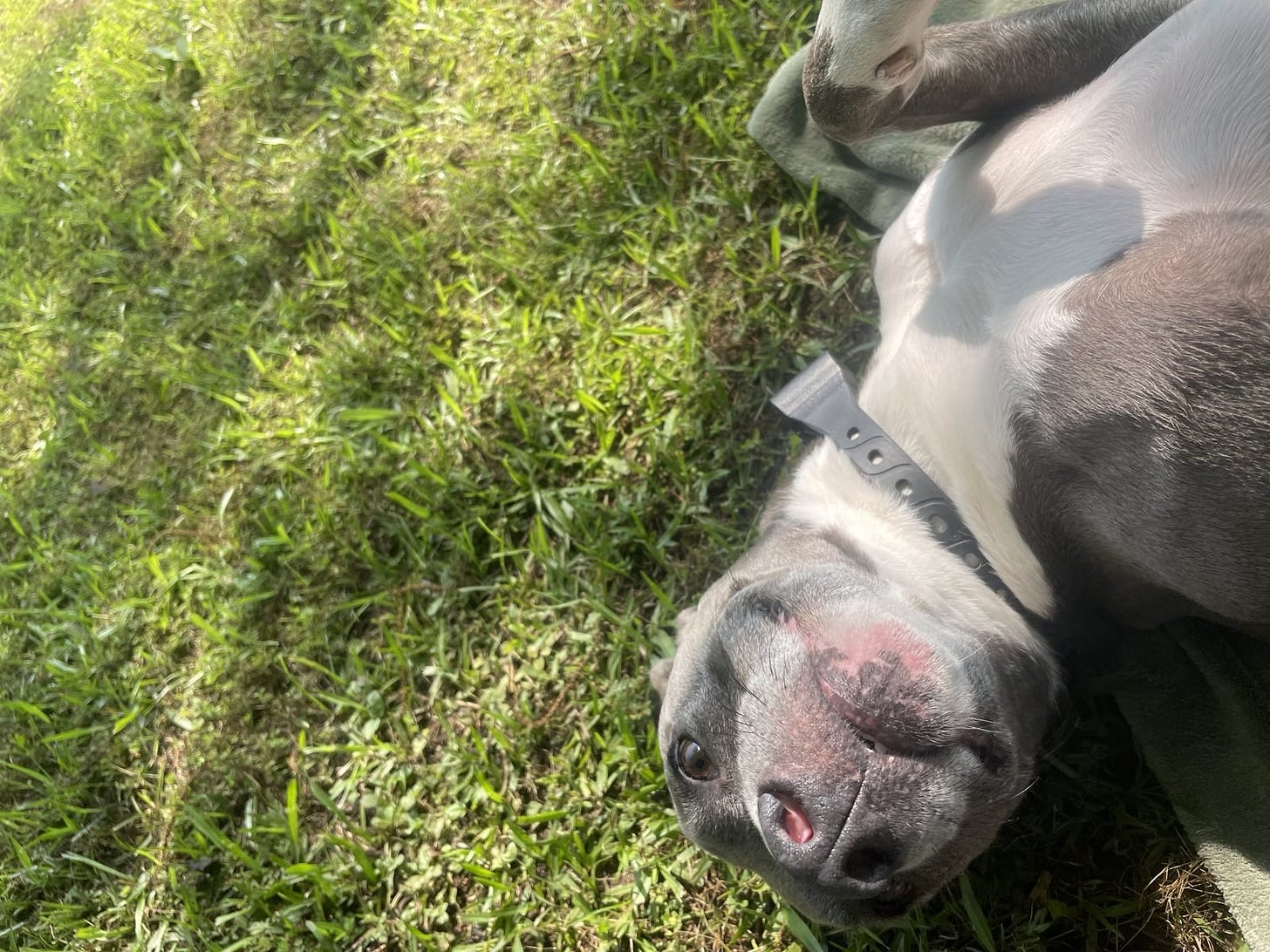Born Kind: Notes on Life-Affirming Discipline
I used to think people were born kind, and I guess I still think that, but I also think that those of us who are not born kind can still be kind.
Currently procrastinating on writing about lawns. If you do not receive an essay about lawns in your inbox in the next few days, know that I failed.
You know those people whose gentleness comes as easy as breathing? With steady eyes and earnest nods, those people who catch you short—their tenderness reminding you of your own callous habits? Those people whose presence remind you that you could be kinder and here is how. This comparison will sound condescending, but I implore you to hear what I mean: it’s like when you meet a new dog and they plop over onto their backs to show you their unprotected belly, unafraid and welcoming and vulnerable. They invite you to be kinder alongside them.
Those of us who are not born kind can practice kindness, discipline ourselves to hold a well of patience, tender words, and soft ears. This is my new realization: I can be kind if I choose to be again and again. And maybe it will get easier (like water off a duck’s back or the smooth round of a stone tucked away in a creek) or maybe it will not (like clenched teeth with matching fists, tear-blurry eyes and a tension headache between the brows). I can choose to be kind, can’t I?
I would like to cleave the word discipline in two, to more effectively differentiate between that which seeks to stifle, obliterate, and smother from that which seeks to sustain life. There is a discipline required to maintaining life, providing the requisite components that allow it to flourish. The work of maintenance requires discipline: domestic labor encompasses so much of this life sustaining work. I must cook and clean to stay alive. I must text and call my loved ones regularly to stay alive. I must take myself on walks, steward my money, sleep well, and forgive myself to stay alive. This is what I mean when I say, life sustaining discipline.
Poet and Ohioan Hanif Abdurraqib has written on this need for discipline when discussing his observance of Ramadan and the daily work of managing anxiety and depression. (I would embed hyperlinks here, but mostly, I gleaned these from his Instagram stories which I watch in a disciple-like fashion.) His candid discussions helped me understand the architecture of discipline I have carefully and meticulously constructed over the years to manage my suicidality. From ages 12 to 19ish, I lived with, at times debilitating, suicidal thoughts. Now, though, when I feel Big Emotions, I have tools in my toolbox — tools I did not have when I was 12. Among them are a deep bench of friends and family with whom I can speak candidly with, the knowledge that I do not want to die and though I feel these things, I know with conviction that I do not want to die, and what has been crucial to my survival: my discipline. Self-hatred comes to me as easy as breathing and would govern my thought spirals, now however, I have the wherewithal to identify and acknowledge what is happening when it is happening so I can intervene. I know that when my emotions are big and my brain is buzzing in a bad sort of way I need to check in with my body: have I eaten a meal in the last 3-4 hours? Have I washed my hair in the last two days? Have I had a good sweat, a thorough physical exertion recently? Have I had a nourishing social interaction today? If the answer is yes to all of these and yet my feeling of poorness persists, I know to rail against the temptation to self-isolate. I am stern with how I talk to myself, wary about negative self-talk and avoidant of cruel self-criticism. All tools in my toolbox, all coping mechanisms that have allowed for my survival—discipline has been requisite to make a home out of my body.
It is so, so, so immensely easy to hurt myself, to blame myself, to cave in and collapse into myself. And it is difficult to manage and care for myself, such work does not come easily. I was not born kind—but that does not mean I cannot choose to be again and again.

The current status quo of where and when I am is domination—the desire, demand, expectation, and perceived necessity out of fear to exert and maintain power over. Principled discipline is needed to maintain a refusal of the status quo, to wake up and lead a life that insists on another way. This is also a life-sustaining and life-affirming discipline, however, this one necessitates a collective political program whereas the previous explorations of discipline focused on the relational and individual.
I was not born kind, but I am choosing to be. This has political implications.
Thank you for reading. If you want to help me with one of my future posts, please email me at dagwoodcrabtree@gmail.com telling me about your void. Does it shriek? Does it hum, moan, or queef? Is your void a steady presence or an erratic being? Does it dance in the basement of your mind or fly on a broom off the roof through the neighborhood? Let me know, I want to hear about it.






